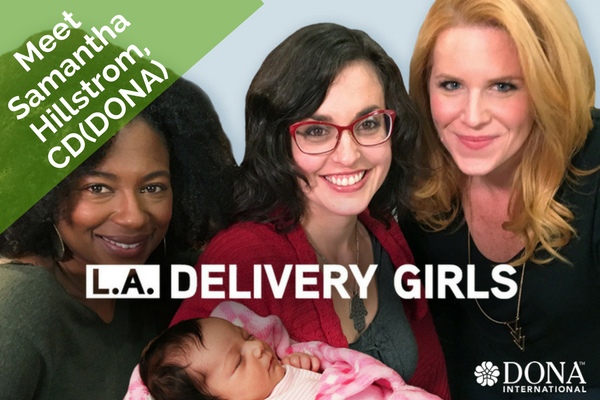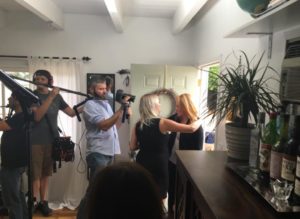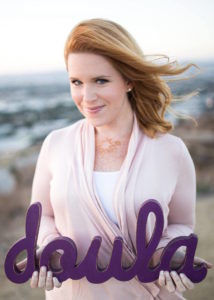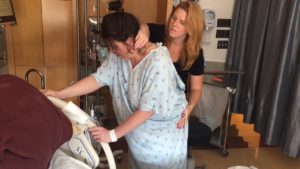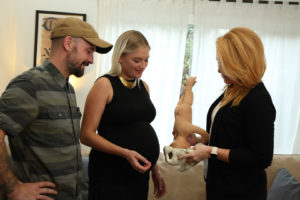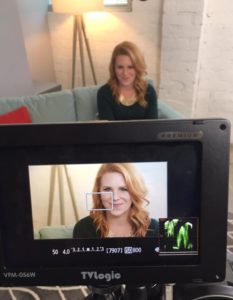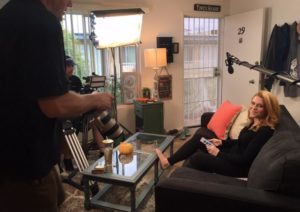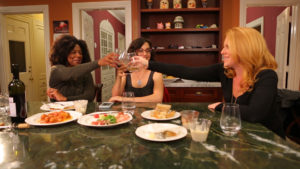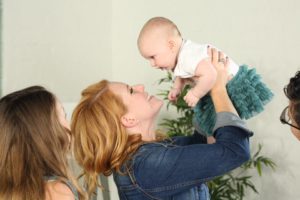By Sharon Muza, BS, CD(DONA), BDT(DONA), LCCE, FACCE, CLE
Last week a new docuseries– L.A. Delivery Girls was released by Verizon Media. This show follows three millennial LA-based doulas as they juggle their friendships with one another, their families and personal lives with the pressures of helping expectant mothers deliver new babies. Samantha Hillstrom is one of the doulas who stars in the series, first appearing in episode three of this first season. Samantha is the only doula on the show who is a DONA International certified birth doula. To the best of my knowledge, this is the first time a reality show has been based on the doula profession and I am delighted that doula work is getting some publicity so families and the public can learn more about what a powerful contribution doula care can make to maternal-infant health. Of course, I had lots of questions to ask Samantha about what it was like to be on the show. She graciously agreed to virtually sit down with me and share a bit of her experience making L.A. Delivery Girls. The show is available to stream for free at the above link.
Sharon Muza: How long have you been a doula? When did you certify?
Samantha Hillstrom: I have been a doula for about four years and certified with DONA International three years ago.
SM: How many births have you attended?
SH: I’ve attended over 30 births in four years while maintaining a full-time job that entire time. Luckily, out of all of those births, I’ve only had to miss work a handful of times. That means a lot of babies born on the weekends or days of going to work after pulling an all-nighter at a birth!
SM: Do you do other birth work? Other non-birth work?
SH: In addition to being a part-time doula, I am also a certified cooperative childbirth educator through the Childbirth Education Association of Metropolitan New York (CEA/MNY). CEA/MNY is a nationally-recognized two-year childbirth certification program based in New York that was a former branch of ICEA.
I left my full-time job as a television news producer at a primetime cable news network to take a more steady job that would allow me to pursue my doula and childbirth education certification. Since then, I’ve been working in corporate communications and now work in communications and PR at a very well-known tech company in New York. I teach childbirth education at night and on the weekends and take a birth doula client every few months.
SM: What drew you to become a doula and childbirth educator?
SH: Anyone who is a birth worker will tell you this line of work is a calling and unlike many birth workers, I didn’t come to this line of work through my own pregnancy or birth experience. I like to refer to birth work, especially my own, as a “passion profession.” Growing up with a mom who framed birth as a normal, natural, physiological process, who told me her natural birth story every year on my birthday — and who showed me the video of my own birth — I always had a curiosity and fascination about birth and it wasn’t something I feared.
When I realized my job in television was unfulfilling, birth work kept coming into my mind. I listened to that thought, quit my job in TV, and one week later I attended my first childbirth education class. Two months later, I attended my first birth and four years later, I’m working in a career that allows me to pay my bills and also the flexibility to attend births. It’s not easy to have two careers and sometimes I surprise myself with making it all work, but once I found my calling as a birth worker, there was no way I could ever not be one. It’s ingrained in who I am and has been the biggest gift of my life.
SM: Can you share about your personal life – where were you born? Where did you grow up? Did you go to college? What did you do before you were a doula?
SH: I was born and raised in Chicago and moved to New York City for college to pursue a career in journalism and communications. I then spent 10 years in NYC, working in television and communications. After a decade in this incredible city, I decided I wanted to see something new and Los Angeles had always been on my radar. I packed up my things and moved across the country because to me, it was much scarier to not move than to have any fears or regrets. While in Los Angeles, I worked full-time in communications, taught childbirth education, and attended births around Southern California. The NYC and LA birth communities are very different and it was really interesting to see how things are done on each coast. Luckily, LA and NYC are places that are saturated with doulas, so there are already built-in, strong communities to join.
After two and a half years, I realized that you could take the girl out of New York but you really couldn’t take New York out of the girl. So I found a new job in corporate communications at an awesome tech company and moved back. Living in Los Angeles was an important step in my growth and journey, and allowed me to fall back in love with NYC in ways I hadn’t anticipated. I have no regrets and like any meaningful experience, it answered questions about myself and my life I didn’t even know I had. I am a better person because of that cross-country move and would recommend it to anyone because when the fear of not doing something is greater, that’s when you decide to act.
SM: Why did you decide to participate in L.A. Delivery Girls?
SH: I was approached to do the show on a total whim by the producers. It’s one of the things you hear about happening in Los Angeles but never believe could actually happen to you. Sure, doulas have been mentioned here or there (mostly inaccurately) in mainstream media, but a whole show about the lives and work of doulas? It was unheard of.
My ultimate goal as a birth worker, and especially as a millennial birth worker, is to continue shed light on how meaningful birth support can be and that doulas, especially, aren’t just for people who want a “certain type” of birth. There are so many misconceptions and so much misinformation about doulas out there. I was so happy to hear about a show that really wanted to thoughtfully examine the impact and importance of the work we do.
So when I was asked to be a cast member, I was happy to share my personal journey if it meant helping shift the stereotypical narrative about doula work. Of course, I was trepidatious about exposing so much of my life and my work. But much like in my doula work, I felt called to the greater purpose of how this could not only positively impact our profession but would expose our work to consumers who otherwise might not have been familiar with doulas. There are so many different types of doulas, as there are so many different types of people. There’s no one right way to be a doula, just as there’s no one right way to give birth.
SM: What were the best parts of being in the docuseries L.A. Delivery Girls?
SH: It’s hard to pick out the best parts because there were so many, but I think the best parts of being on the show are yet to come. I think the best part truly is that as more people watch the show and get familiar with our work, they will make more informed and thoughtful choices about their pregnancy, birth, and postpartum care.
The bigger picture aside, the best parts of filming the show were the relationships I had with my clients and students. I am very much a “friend/sister” doula and educator, and I loved going through this experience with them. Sharing my life as a doula is one thing, but sharing your journey to and through parenthood is another and I am so grateful to them for opening up their lives.
SM: Was it time-consuming to work on the show?
SH: Working full-time and being a part-time birth worker, in and of itself, is extremely time-consuming. It’s not easy and it’s a constant juggling act. Filming the show wasn’t any more time-consuming for me because I was being filmed in my normal life.
SM: Do you feel like L.A. Delivery Girls portrayed the life and work of a doula accurately?
SH: I’m watching the show for the first time along with everyone else, so it’s too soon to tell. That said, I do believe the producers had our best interest, and the interest of birth work, at heart. Many of them came in knowing absolutely nothing about doula work and I think they tried their best to make a great show that was fun to watch, while also respecting the work we do.
SM: What was it like to be doing your work with a production team following you everywhere and watching and recording every move?
SH: It was as weird and as oddly normal as you can imagine! I’m very lucky that I worked with some great producers and some very nice crew members who I felt comfortable with over time. Having a camera following you around makes you acutely aware of what comes out of your mouth. Not only did I want to protect how I came across, but I was incredibly aware of what I said about birth and doulas as I felt a responsibility to “get it right.” I cannot control how things are edited, so ultimately, I just had to let that go and be myself.
SM: What was it like to work with the other doulas? Collaborative? Competitive? Are you still in touch with them?
SH: Working with Becca Gordon and Shani McLeod was such an amazing experience and I feel so lucky and proud to be sharing a show with them. They are not only wonderful, smart doulas, but they are incredible moms, women, and people. We really had a “one for all” mentality because this experience is so unique and we were the only ones going through it together. It was an incredibly supportive and collaborative experience between all of us and we also served as each other’s backup doulas in the show.
We are all different doulas but we also have many common threads between us and I think that’s why it worked so well. I still talk to them and I am so excited to watch them as doulas on the show, too!
SM: What do you hope people take away from this show?
SH: We focus so much in this society on, “healthy birthing person, healthy baby,” implying that’s the only thing that matters at the end of the day, regardless of what actually happens in the birth. But it’s not the only thing that matters and by boiling it down to only that, you negate how important and impactful the experience is on a person. Ultimately, I hope this show illustrates that birth matters and informed consent, respect, and compassion are paramount to the birthing experience.
I want to thank Samantha for her time and effort to tell me (and all of you) a bit about herself and her experiences on L.A. Delivery Girls. After learning more, I think that Samantha is pretty courageous to allow herself to be filmed while working as a doula and childbirth educator. I appreciate how thoughtful and intentional she was to represent the doula profession in the best light I also have the deepest respect for those families that were willing to share their journeys with all of us. I look forward to watching the episodes each week and am hopeful that the show portrays doulas in a positive light and with the respect the profession deserves. Do you think that you would be interested in being on a future season of L.A. Delivery Girls? Have you seen the show? Let me know your thoughts in our comments section.


